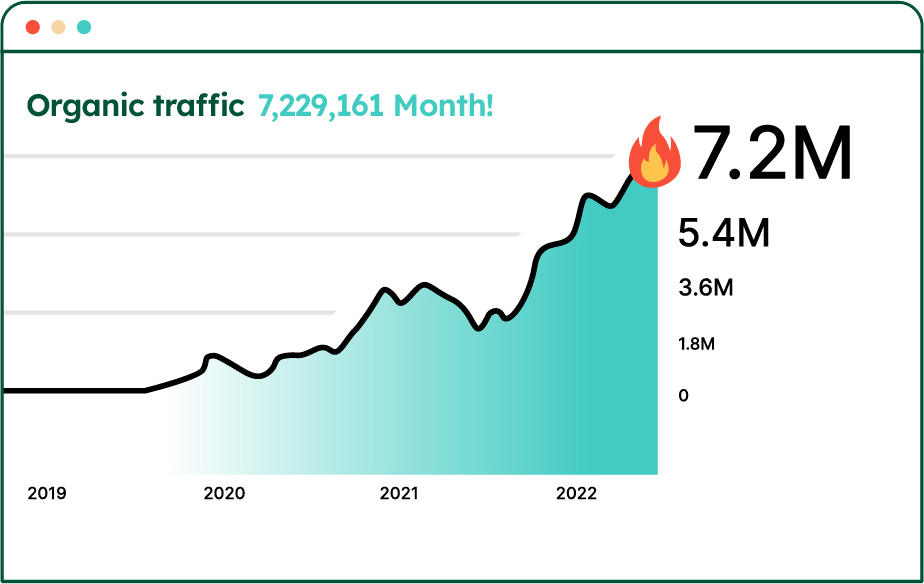In the ever-evolving world of online content, Search Engine Optimization (SEO) writing is a crucial skill to master.
As search engines become increasingly sophisticated and writing trends constantly evolve, it’s important to keep up with the latest SEO writing practices if you want to stay relevant.
Effective SEO writing involves optimizing your content to rank higher in Search Engine Results Pages (SERPs), drive traffic to your website, and increase your online visibility.
To achieve this, you need to focus on creating high-quality content that is relevant to your audience, incorporating targeted keywords, and making use of proper formatting techniques.
That’s why, in this article, we will explore the essential rules, tips, and best practices for SEO writing in 2023, helping you stay ahead of the competition and maximize the impact of your online content.
What Is SEO Writing?
SEO writing focuses on creating content that’s optimized for Google and other search engines. Its primary goal is to rank content on the first page of search results for specific keywords. That way, when your target audience searches for relevant terms in your niche, they are more likely to click on your website and discover what you have to offer.
However, creating content that ranks high on search engines is easier said than done, because there is so much competition. To do it, you need to find the most relevant and popular keywords in your niche and create quality content that both informs and entertains your readers.
But how does Google determine whether your content is good or not?
Google and other search engines use algorithms that go through your website and determine whether your content is good or not. These algorithms analyze relevant keywords, content length, authority, readability, and other factors to determine where to rank your content.
If you don’t use SEO writing, these algorithms may not be able to understand what your content is about, which will result in lower rankings.
Why is Writing Important for SEO?
Search engines like Google want to provide the best possible experience for their users. That’s why they display the most relevant, engaging, and quality content at the top of search results.
And that’s where good writing comes in.
Well-written, engaging, informative, and search engine-friendly content helps you rank on the first page of search results and improve your website’s visibility. After all, who looks beyond the first page when searching for something on Google?
According to a study done by Backlinko, almost nobody, as only 0.63% of people will click on a website that’s on the second page of Google.
But that’s not all.
Where you rank on the first page matters as well. The same study discovered that the first result gets 27.6% of all clicks, and the number goes down with each spot. The last search result on the first page of Google receives ten times fewer clicks than the first result.
So, if you want your website to be as high as possible on Google’s search results, SEO writing is one of the best ways to do that.
SEO writing is also a vital component of SEO strategies like content marketing and link building. By creating quality content, you can attract valuable backlinks to your website, which helps improve your authority and search engine rankings.
In addition, SEO writing is a go-to strategy for many marketing experts because it is inexpensive, great for attracting organic traffic to your website, and has long-term potential.
Basics of SEO Writing
Although there is no magic formula that guarantees a number one spot on SERPs, there are several things you can do to increase your chances of ranking high.
One of the most important things for SEO writing is to find popular keywords in your niche and use them to create content. Keywords are words and phrases people type into the search box when looking for information in your niche.
Let’s say you’re in the career development niche and want to create content for a popular keyword, such as “how to make a resume.” You want to add the keyword in the title, i in your subheadings, and naturally, sprinkle it throughout the article. In addition, you want to use other keyword variations to help search engines understand what your content is about.
But SEO writing is not just about keywords.
You also need to create content that provides valuable information and satisfies the user’s search intent. If you stuff your page with relevant keywords but don’t create quality content, search engines and readers will be able to tell. In turn, readers will leave your page, and this will hurt your rankings.
One of the ways to create quality content is to improve its structure. You can do that by using headers and subheaders to break up your content into easy-to-scan sections. In addition, you want to ensure that your content flows logically and that your readers can gain real value from it.
If you’re trying to get good at SEO writing, you must also pay attention to readability. That means using shorter sentences and paragraphs, avoiding technical and overly complicated terms, and writing in easy-to-read and conversational language.
Lastly, you should use plenty of formatting elements like bullet points and numbered lists to make your content more visually appealing.
6 Essential SEO Writing Rules
SEO writing can help you rank better on search engines and attract more organic traffic to your website. But if you don’t do it the right way, you won’t see any results. Here are some of the essential SEO writing rules and tips for creating better content:
#1. Write for Humans
Writing for search engines may help you climb the SERPs in the first place, but it’s people who are actually going to read it (unless you’re writing for robots, in which case you can ignore this advice).
Writing exclusively for search engines is like preparing a meal while only focusing on nutritional value. Sure, a nutritious formulation of ingredients would be enough to fuel your body, but it lacks flavor and punch that feeds your soul like a gourmet meal. So, it’s not only about nutrition. It’s about the warm atmosphere, enticing smells, unique textures, and delicious ingredients combined in a beautiful presentation that creates a memorable experience.
It’s the same with SEO writing. You want to satisfy search engines, but you also want to create content that’s engaging, thought-provoking, and impactful on your readers. That way, you can cook up some content that’s more appealing to the human palate and leave your readers hungry for more.
#2. Consider Google’s Algorithm
Google is the largest search engine, and it’s essential to understand how it works if you want to write better content. According to Backlinko, there are over 200 different factors that affect how your content ranks. The most important ones include content quality, uniqueness, backlinks, domain authority, keyword usage, and optimization for RankBrain.
RankBrain is Google’s machine learning algorithm that helps deliver more relevant and personalized results to people typing into the Google search box. It analyzes content quality, freshness, uniqueness, keywords, backlinks, and other factors to come up with the best results.
Google confirmed that RankBrain was among the top three ranking factors in 2016. And although a lot has changed since then, RankBrain still remains vital for SEO. That’s why you need to optimize your content for this algorithm if you want to rank.
#3. Perform Keyword Research
Before you start writing, you need to perform keyword research and identify the most relevant keywords in your niche to base your content around. Keyword research is kind of like doing detective work. You need to figure out what your potential audience is searching for and use that information to optimize your content. And just like any good detective, you need a few tools and tricks to solve the case.
The most popular keyword research tools include Google Keyword Planner, SEMrush, Ahrefs, Ubersuggest, and Moz Keyword Planner. These tools can help you get a list of potential keywords and important stats.
Then you need to analyze factors like relevance, search volume, and competition to find the best keywords and help your content rank higher.
#4. Make Your Content Unique
Search engines penalize plagiarized content, so it’s crucial to be original when writing. If you copy text from another website, search engines may mark it as spam and penalize you. This hurts your ranking and your reputation.
If you want to outsmart your competitors, you also need to create content that’s more original and valuable than what’s ranking on the first page. That way, Google will reward you for unique content and boost your search result ranking.
Long story short, if you just copy what your competitors are doing, you don’t stand a chance of landing on the first page of search results.
#5. Link to High-Authority Websites
You should use citations and external links to point your readers to credible sources where they can find evidence for your claims or more materials about the topic in hand. In addition, linking to high-quality websites shows search engines that you have thoroughly researched and understood the topic.
That way, you associate your content with authoritative sources and gain credibility in the eyes of search engines.
Most importantly, when you link to helpful information on other websites, you improve your readers’ overall experience. That will make them trust you more and return to your website when they need more information about similar topics.
#6. Create Longer Content
We are bombarded with information from all sides, and our attention spans seem to be getting shorter. However, Google actually prefers long-form, in-depth content.
The average first-page result contains 1,447 words, according to Backlinko. Long-form content became even more important after the latest Google algorithm update, which rewards longer, more informative content.
This makes sense since the longer the content, the more chance Google and other search engines have to figure out what it is about. However, long-form content can also overwhelm your readers. That’s why it is vital to use easy-to-understand language and break up your articles into smaller chunks.
To make your content more visually appealing, you need to use headers, subheaders, bullet points, and numbered lists. In addition, it’s important to keep your paragraphs between one and three sentences to avoid those frustrating walls of text.
7 Tips to Improve Your SEO Writing
Want to take your SEO writing to the next level? We’ve got your back.
This list of actionable tips will help you identify the best strategies to step up your SEO game and launch your content to the top of SERPs.
#1. Follow SEO Trends
Search engine algorithms are constantly changing and getting better at recognizing quality content. As a result, SEO techniques and trends are continually evolving to keep up with these changes.
That’s why you need to keep an eye out for what’s happening in the SEO world and learn about the latest developments. Doing this can help you adapt your strategies and stay ahead of the curve.
The good news is that you don’t need to be a tech wizard to keep up with the latest SEO trends. Simply do a little research from time to time and learn more about the new algorithm changes. Keep an open mind, as the willingness to adapt can help you gain an advantage over your competition and position yourself as an authority in the industry.
#2. Measure Results
Measuring results is the best way to figure out what’s working and what isn’t.
If you don’t keep track of your results, you’re essentially deciding to operate with a blindfold. You won’t be able to get valuable insights and ensure your SEO writing campaign is successful.
So, if you don’t want to leave the success of your SEO campaign up to luck, it’s vital to start tracking results.
To track SEO results, you can use tools like Google Analytics, SEMrush, or Ahrefs to monitor a website’s traffic, keyword performance, search engine rankings, and other relevant factors. That way, you can see how each piece of content performs and adjust your SEO strategy to improve online visibility.
After all, making data-driven decisions is the cornerstone of any successful business.
#3. Create Engaging Content
We’ve already mentioned that creating engaging content is one of the most important aspects of SEO writing. But we want to make sure that this point is clear. After all, even Google warns people to avoid creating search engine-first content and focus on people-first content.
So, what does Google mean by that?
In a nutshell, your focus should be on creating exciting content that provides value to the readers. Sure, keywords and all that other SEO stuff are important, but remember that your main goal is to provide a pleasant, reader-friendly experience.
Engaging content will keep the visitors on your website for longer, which signals that your content is good. In addition, people are more likely to share engaging content on social media and link to it, which affects your trustworthiness and search engine rankings.
#4. Add Meta Descriptions and Alt Text to Images
Meta descriptions are short blocks of text that closely describe what the content on the page is about. They help your readers and search engines better understand and rank your content. But for some reason, many SEO writers fail to take advantage of meta descriptions.
Writing a short and informative meta description that contains your target keyword can help your content get more exposure.
Meanwhile, an alt text is a short description of an image on your web page. Just like with meta descriptions, alt text helps search engines better understand your content. That’s why it is crucial to be as descriptive as possible and include your target keyword there as well.
#5. Understand the Basics of SEO
SEO requires understanding search engine algorithms, online marketing strategies, and user behavior. This complexity and consistent changing of the rules can make people feel intimidated by SEO.
After all, with so many factors affecting search engine rankings, it’s easy to think there’s no way to keep track of them.
Luckily, you don’t need to know everything.
The only thing you need to understand is the essence of SEO – optimizing content to rank better on search engines in order to bring more visitors to your website and increase your visibility.
Once you understand this and master the basics of SEO, it will be easier to build on it and eventually pay more attention to details.
#6. Use Outlines
When it comes to SEO writing, it’s important to create content that satisfies the reader and meets the requirements of search engines. To do that, your content needs to be better than what your competitors have to offer, it needs to provide real value to the reader, and tick all the SEO boxes.
Having an outline can be a game-changer for achieving all three of these objectives.
Outlines help writers stay within a topic, divide content into smaller, scannable sections, and satisfy user intent.
In addition, if you’re outsourcing content creation to freelance SEO writers, providing them with a clear outline helps them focus on meeting the specific search intent for the targeted keyword, instead of writing random content.
#7. Optimize Your Content for Featured Snippets
Featured Snippets are short snippets of text that appear on the top of Google’s search results. Their goal is to provide an immediate answer to a search query, improving user experience.
Google pulls the information for Featured Snippets directly from websites, so it’s important to optimize your content if you want to be featured. After all, it is a unique opportunity to reach “position 0”, which is what many SEO experts call Featured Snippets, which appear even above the first results. That’s why Featured Snippets attract a lot of organic traffic.
To optimize your content for Featured Snippets, you need to find keywords that already have Featured Snippets and try to create better alternatives. Keep the text between 40 to 60 words, and make sure your content is accurate, informative, and concise.
7 Best SEO Writing Practices
Getting familiar with the best SEO writing practices helps you rank better on Google and other search engines. The truth is that there’s tons of outdated SEO advice on the internet. That can make it hard for a beginner to figure out what works and what doesn’t.
Here’s some expert-vetted advice to improve your SEO writing:
#1. Keep Both Humans and Search Engines in Mind
Good SEO writing requires a delicate balance between satisfying the needs of both search engines and humans. That’s why it is equally important to incorporate keywords, optimize your content for search engines, and provide value and entertainment to your readers.
You need to remember that it’s humans who read your content and buy your products or services. Search engine optimization helps you rank better and drive more traffic to your website, but content quality is what seals the deal.
The bottom line is – you need to find a way to satisfy both search engines and humans. When you hit that sweet spot, your SEO campaigns will become a lot more successful.
#2. Write Attention-Grabbing Headlines
Even if you manage to rank on the first page of search results, you still need to make people click on your website instead of the others. One way to do this is to create attention-grabbing headlines that provoke curiosity and make people want to read more.
After all, your headline is the first point of contact between you and your target audience. And you want to make a good first impression if you want to earn that click.
In addition, headlines inform search engines about the topic of your content, which, in turn, helps them determine how – and where – to rank it.
A good headline should give readers and search engines a solid idea of what the page is about while still keeping a little mystery. The best way to do this is to keep your headlines short and to the point.
However, if your goal is more social media engagement, a Backlinko study suggests a different approach, as longer headlines (14-17 words) generate 76.7% more shares.
#3. Add Images and Videos
Humans are visual creatures, and adding images and videos to your written content is a great way to make it more interesting and aesthetically pleasing. Text-only content, on the other hand, may appear boring or even overwhelming, which is why people are less likely to read it than content with images.
Today, it’s relatively easy to find the right images for your content. You can choose between creating original images, searching one of many stock websites, or using AI tools to create something new. Just make sure to compress the images to ensure a fast page loading speed.
People today are also watching more videos than ever before. According to a HubSpot report, 66% of people watch video content to learn more about brands and products. So, incorporating a video in your blog post can be an excellent way to get your point across and spread more awareness about your brand.
#4. Take Advantage of Social Media
The number one goal of SEO writing is to make your website more visible on search engines. However, you can also take advantage of other platforms to achieve that. For example, shares and engagement on social media can boost your content’s momentum and affect search engine rankings.
Here’s why social media exposure is so important…
There were over 302 million social media users in the US in 2022, according to Statista. Over 84% of people in the US are active on at least one social media network. So, if you want to reach your target audience, you can easily do so by taking advantage of social media.
#5. Ask Experts for Help
Mastering SEO writing is quite a challenging task that requires a lot of time and effort. If you’re not ready for this step, but want to see better SEO results, hiring an expert is the best approach. You can hire freelance SEO writers or agencies to help you identify the right strategy for your website.
There is no unique formula for SEO writing that produces results in 100% of cases. That’s why hiring a team of experts is a good idea, as they know proven ways to help you rank fast. SEO writing experts can create an optimized content production strategy that aligns with your goals and handle all the heavy lifting.
SEO writers also bring knowledge and creativity that gives you a competitive edge and allows your business to stay ahead of the competition.
#6. Structure Your Posts
No matter how good your SEO writing is, most website visitors won’t read your content from start to finish. The majority scans your content to find specific information or a solution to their problem.
That’s why it is crucial to ensure your posts are easy to scan and structured in a way that allows your readers to find the information they’re looking for right away. Otherwise, they’ll just look for a different website where they can easily find what they need.
To structure your content, you should use headlines, subheadings, bulleted lists, tables, and other elements to improve readability and make your content easy to scan.
#7. Do Internal Linking
Linking to other posts on your website is important for two reasons. First, it helps search engines create an accurate sitemap of your website and understand the importance of each page. The second reason is that internal linking helps your readers discover more of your content, which keeps them engaged on your website. This increases your chances of converting them into loyal customers.
When a reader clicks on another page on your website and spends time reading different pieces of your content, it sends a signal to search engines that you are doing something right. In addition, it increases your authority and trustworthiness among your readers.
An important thing to remember when linking to your pages is to keep the anchor text natural. Use descriptive text, and let the reader know exactly where the link will take them. In addition, you should only link to pages that are relevant to the content of that webpage.
Conclusion
That’s a wrap on the most important SEO writing rules, tips, and tricks for 2023.
We hope this detailed list has helped you learn the importance of SEO writing and what you need to do to get more organic traffic.
If you want to learn more about SEO writing and related topics, make sure to visit our blog, where you’ll find detailed insights into everything SEO-related.





